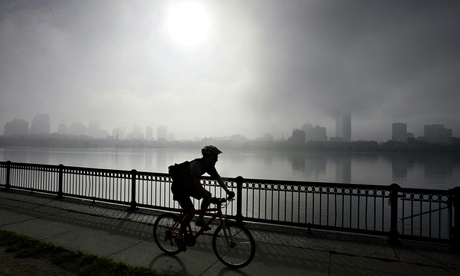
Boston, the city that ignited the American war of independence, is inextricable from the work of New England writers. As Linda Barnes joked in a recent detective novel, Lie Down With the Devil, these Massachusetts writers are interwoven into the fabric of the city:
"In the summer of 1960, Boston's West End was bulldozed to rubble … When the dust cleared, there was Charles River Park … The tall, pale buildings had no ties to New England, so to grab some local flavor, they named the towers after Hawthorne, Whittier, Emerson, Lowell, and Longfellow. I like to imagine those old dead white guys rolling in their graves. Not to mention stogie-smoking Amy Lowell."
You could easily add James Fenimore Cooper before them, Louisa May Alcott or Henry James after; indeed, it would be hard to visit Boston without a copy of The Bostonians. Like The Europeans, this is a look at aristocratic Boston in the late 19th century, but The Bostonians is also James's most political novel, diving into the maelstrom of social and political activism emanating from the city. As Basil Ransom, a conservative, and Olive Chancellor, a pioneer in the feminist movement, quietly struggle for Verena Tarrant's intellectual and emotional commitment, Verena's predicament encapsulates the decision for women at the turn of the 20th century: marriage or independence. Those who have already ploughed their way through James and do not fancy a rematch, try William Dean Howells's contemporaneous The Rise of Silas Lapham, or a modern perspective: the Pulitzer prize-winning The Late George Apley by John Marquand is a tragicomic satire of upper-class Boston life taking in the mid-19th century to the Great Depression. Disdainfully carry these while promenading through the Emerald Necklance, the string of parks running to the Public Garden.
In general, though, Boston seems to make many more cameo appearances than headline acts: part of William Faulkner's The Sound and the Fury finds it setting in Boston, as does some of Infinite Jest by David Foster Wallace. Indeed, it is curious how often it the city appears in literature in an altered or dysmorphic state. A partially fictionalised, post-nuclear Cambridge and Boston are the settings for Atwood's The Handmaid's Tale; Shutter Island (Dennis Lehane's novel, rather than its more obscurely unlocatable film counterpart) takes place on a fictional island in Boston Harbour. My favourite though is Looking Backward, a utopian science-fiction novel by Edward Bellamy written in 1887 and set in 2000, in which Julian West falls into a deep sleep and wakes in a socialist Boston. Somnambulating the streets of this futurist Boston with his Virgilian guide Doctor Leete, Julian debates the merits of the "progress" he sees, most notably the nationalisation of all industry using an "industrial army" to co-ordinate supply and distribution. The book was much more popular than William Morris's now far better known News from Nowhere, but it must be said that 21st-century Boston isn't that different to the one Julian returns to:
"I reached Washington Street at the busiest point, and there I stood and laughed aloud … For my life I could not have helped it, with such a mad humor was I moved at the sight of the interminable rows of stores … Stores! stores! stores! miles of stores!"
Hmm – maybe don't go for the shopping if you've an ounce of literary pride!
But what trip to Boston would be complete without a pilgrimage to Fenway Park, the home of the Red Sox, "a lyric little bandbox of a ballpark", according to John Updike in Hub Fans Bid Kid Adieu: "Everything is painted green and seems in curiously sharp focus, like the inside of an old-fashioned peeping-type Easter egg. It was built in 1912 and rebuilt in 1934, and offers, as do most Boston artefacts, a compromise between Man's Euclidean determinations and Nature's beguiling irregularities".
Maybe the best guide to the essence of the city as a whole though is Robert Lowell's poem The Public Garden, a beautiful elegy to the emotional cadences of the city, a psychogeography before the concept became so irritatingly popular. Just don't walk to the waterfront at Back Bay and recite his friend Elizabeth Bishop, who moved to the city in 1974: "Should we have stayed at home, / wherever that may be?"

